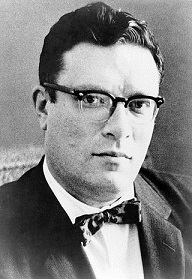Centuries past are like the long night, a mysterious dream world. The modern, networked Earth is like daybreak, a world-wide awakening.
The fifty years 1945-1995 could be considered as a sort of ‘twilight zone’ between the two. The bulk of thinking and research done during this period is too new to be of any great historical or even deep nostalgic interest. Yet it is too old to be treated as current knowledge in the Internet age, where freshness and novelty are valued. In addition, we are still inside several of the epic transformations that began in this time. It’s difficult to appreciate and comprehend a revolution when you live within it. Our blind spot for this period is a great tragedy.
This period could be called the ‘Asimovian Epoch’. Here’s why.
Isaac Asimov (1920-1992) was perhaps the last great polymath. He was a biochemistry professor and author, publishing (writing or editing) over 500 books (covering 90% of the Dewey Decimal Classification system) and many thousands of shorter works. That’s an average rate of over one book per month over his long career – one of the greatest outbursts of creativity in history. His favorite topics included history, physics, comedy, and English literature. He was quite arguably the greatest science fiction writer of all time. He, Robert Heinlein, and Arthur C. Clarke are known as ‘The Big Three’ of the Golden Age of science fiction.
Asimov was a nexus of 20th century thought.

He was strongly influenced by Greek and Roman classics, Shakespeare, Gilbert & Sullivan, and also by contemporaries such as Kurt Vonnegut, Heinlein, Clarke, Harlan Ellison, Carl Sagan, and Marvin Minsky. He in turn influenced the likes of Paul Krugman (Nobel Prize in Economics), Elon Musk (SpaceX, Tesla), most science popularizers (happily now becoming too numerous to list), virtually all science fiction writers, and of course millions of readers.
Optimism came early to Asimov, perhaps because he spent so much time as a child in his father’s candy store. Many were initially drawn to science as teenagers by his optimistic and compelling vision of science and technology. Given the advances that 20th century science brought, such as space exploration, computation, automation, microbiology, etc, our debt to him on this account alone is inestimable. His masterpiece, Foundation, has deeply influenced many others, including me: Future Psychohistory
It has become fashionable for some to be suspicious of science and even liberal education. This was a trend that Asimov fought tirelessly against all his life. He warned against the false notion that democracy means that ‘my ignorance is just as good as your knowledge’
He went even further, exploring the frontiers of individuality and self-education:
Self-education is, I firmly believe, the only kind of education there is.
Some even credit Asimov with predicting the Internet, especially its use for personalized education. He envisioned a world in which people could pursue their own interests, unfettered by the standard classroom, open to new ideas and serendipity.
Ironically, the very technology that he hoped would spur individuality and diversity has the opposite effect at times. One example is digitization and archiving of published material. There was a time when books were expensive, highly personal possessions that stayed with the owner for a lifetime, and were even sometimes handed down across generations. People would store letters, pressed flowers, and other snippets of life between their pages, and write personal margin notes. Books were not just repositories of language, they were time capsules and valuable historical accounts. However, the best book to scan is a pristine, un-personalized volume. Once it is scanned, future researchers use this one version increasingly exclusively. Individuality and diversity are squelched.
A pervasive basic understanding of science was Asimov’s constant goal. He often took the opportunity to describe science not as a storehouse of absolute truth, but rather as a mechanism for exploring nature. Science is not a dogmatic belief system. Learning happens when one asks questions of the universe and then listens attentively and objectively with the ears of science. He wrote eloquently on scientific models, logic, and inference. An example is this essay.
Of course Asimov is best known for his robot stories, and his ‘Three Laws of Robotics’. In 2010, the U.S. Congress established National Robotics Week in his honor. It’s possible that he saw artificial intelligence as a way for intellect to exceed the bounds of human bias, subjectivity, and mortality.
I never met Isaac Asimov, but I have spoken to several people who did have that pleasure. Each one related the profound impression he made on them. He died in 1992, but his books continued to be published posthumously. By the end of 1994, the World Wide Web Consortium had been founded at MIT. The dramatic rise of the Web marks the end of the Asimovian epoch.
Academia can sometimes degenerate into a vicious paper chase, with Ego in the front seat, Science in the back seat, and Humanity locked in the trunk. Asimov famously said,
The most exciting phrase to hear in science, the one that heralds new discoveries, is not ‘Eureka!’ but ‘That’s funny…’
Sadly, with hyper-specialization and the loss of interdisciplinary thinkers like Isaac Asimov, the catch-phrase of science has increasingly become: “Oooh! Shiny!”

